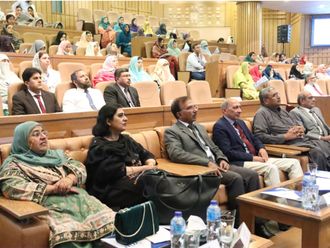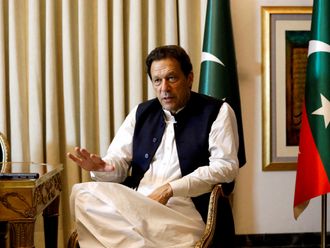Islamabad Donor countries have urged the government to press ahead with planned measures to boost revenues by bringing untaxed segments of the rich in the country into the tax net, while seeking foreign assistance for economic recovery and overcoming effects of recent flood catastrophe.
The point was stressed by delegates of different countries during the two-day meeting of the Pakistan Development Forum (PDF), which concluded in the capital on Monday.
During the meeting, Japan announced additional support of $500 million (Dh1.83 billion) while the US special representative for Afghanistan and Pakistan, Richcard Holbrooke, promised to fast-track release of $500 million under the Kerry-Lugar Act towards reconstruction in the flood-hit region.
Finance Minister Abdul Hafeez Shaikh told the guests that the government was working hard to generate resources.
He dismissed a suggestion made a day earlier by interior minister Rahman Malek who while talking to the media called for waiver of $50 billion in international debt owed by Pakistan.
Budget revision
Seeking debt write-off was never an option before the government, Shaikh said. He said such a move could negatively affect sovereign credit rating and make it difficult for Pakistan to raise money from the capital market. He said Pakistan did not want to be included in the list of those countries which had availed themselves of debt waivers and become an international "pariah".
The government outlined at the meeting a revised budgetary framework for the current financial year to July next, envisaging a higher fiscal deficit of 4.7 per cent, reduction in development outlays and additional taxation and reform measures.
Finance Secretary or top-most finance ministry official Salman Seddiqi said the revenue target had been reduced while bills for reformed general sales tax (RGST) and levy of a flood surcharge on taxable income for six months had been tabled in the parliament.
The objective was to improve tax-GDP ratio from the existing nine, the lowest among the countries of the region, to 12 per cent in two years and 15 per cent by 2015, Seddiqi said.
New proposal
The RGST is a consumption-based tax, levied on any value that is added to a product. There are 141 countries that have implemented this tax successfully, according to economic analysts.
Dr. Ashfaque H. Khan, a prominent economist, says the RGST was facing stiff opposition because of misconception that it is highly inflationary, will increase the tax burden of poor consumers, and that it is a recipe for destroying businesses and trade in Pakistan.
Lack of affective communication with stakeholders and general public has led to the building up of these wrong perceptions, for which the government is to blame, he said in an article published yesterday.
"How can existing GST rates in the range of 17-23 per cent when reduced to a uniform rate of 15 per cent under the RGST destroy businesses and trade in the country? How can a reduction in tax burden be treated as anti-business and anti-trade? The poor, by definition, spend more on food items which are largely exempt from the RGST. Furthermore, poor consume less and hence pay little or no RGST. Hence, why should the RGST increase tax burden of the poor consumers," he asked.












